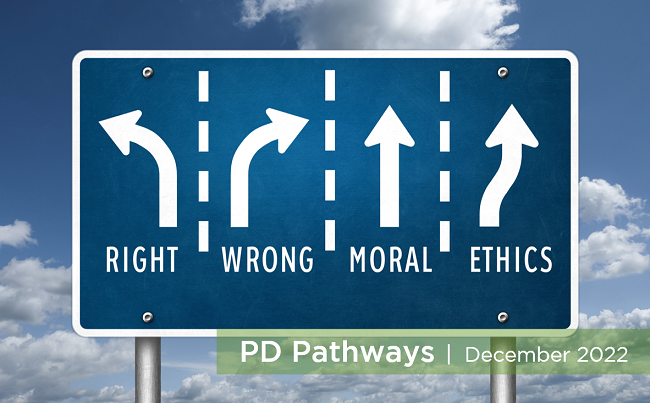[Set Slide Image]
PD Pathways
PD Pathways is a monthly digital newsletter for CPAs and business professionals, showcasing the latest news and resources in CPABC Professional Development.

Ethical vs. Legal Standards
By the CFI Team, originally published at the Corporate Finance Institute website.
A summary of the differences between both, and how they can contradict each other.
Ethical vs. Legal Standards in Finance: What’s the Difference?
Making decisions that are both ethical and respectful of laws is something that investment professionals around the world are constantly mindful of. Such decisions stem from knowledge of the legal system, having the interests of all parties at heart and an individual’s own professional judgment. Nonetheless, there exist situations where possible actions violate either professional ethics or the law. In this article, we will explore the differences between both and guide decision making in such scenarios.
Defining Ethical Standards
Ethics refers to the moral course of action that takes into account and strives to benefit all stakeholders in a given situation. Prior to making an ethical decision, an individual must be able to identify the possible unethical course of action and label it as such. Ethical conduct also involves striving to create the best outcomes for the investment professional, the client and the firm.
For example, an investment fund may explain the risks of investing in different asset classes prior to creating a portfolio or promising clients a certain expected return. While such a disclosure may dissuade some potential new clients, it will improve the firm’s long-term profitability since this action may reduce the chance of dissatisfied clients pursuing legal action against the firm. An investment firm is not necessarily obligated to make such a disclosure but may do so in a bid to be perceived as ethical.
Defining Legal Standards
Within the investment industry, defining legal standards is much easier than ethical standards. Acting legally means respecting the applicable bodies of law in the firm’s jurisdiction. For example, a company may be required to have accounting practices that adhere to the GAAP or IFRS standards.
Such laws have been put into place by regulators after considering all impacts that new legislation will have. Laws are usually reactive, meaning that they are implemented after major scandals and aim to remedy an unhealthy environment; such as the Sarbanes-Oxley Act. The best laws are proactive and aim to prevent scandals by requiring preventative, best-practice actions.
Ethical, but Illegal
Going back to ethical vs. legal standards dilemma, a decision can be ethical but violate certain laws. A common example of this is “whistleblowing,” or an individual’s disclosure of dishonest, corrupt or illegal activity. While it may be ethical to denounce such activity, doing so may violate organizational policies and thus be considered illegal.
When faced with a dilemma like this, an investment professional should consider the repercussions of his actions prior to acting. There may be alternative systems put into place to remedy such activity such as having internal discussions or using an anonymous tipping service. Point being, there are no set frameworks in place to guide an individual’s behavior in such situations. The investment professional will have to resort to his/her best judgment and follow the course of action that will bring the most benefit to clients, family, colleagues, employers, and market participants.
Unethical, but Legal
Conversely, a decision can adhere to certain bodies of law but be seen as unethical. For example, some countries do not have laws that prohibit trading while in the possession of insider knowledge. Thus, while it may be legal to trade under these circumstances, it is considered by many to be highly unethical.
Here again, an investment professional should consider the full repercussions of his/her actions. For instance, the professional may ask themselves why they are in possession of such information in the first place and take actions to avoid being in such situations again in the future. Alternatively, the professional may choose to ignore this information and continue trading as per normal.
Conclusion
When investment professional finds themselves in a situation where the only obvious courses of action violate ethical or legal principles, they must assess the situation and consider new courses of action that don’t. More importantly, firms and individuals must constantly take proactive action to mitigate the likelihood of such situations arising.
Corporate Finance Institute (CFI) provides the leading resource for finance professionals, including productivity tools, certification, and online training for financial modeling, valuation, lending, securities, capital markets, data science, business intelligence, cryptocurrencies, and more. Learn more from CFI presenters Jeff Price and Morgan Hamel at one of their upcoming seminars in December and January. You can also register for the CFI Archived Webinars designed for finance professionals and industry practitioners who want to master the art of corporate finance.

In-Person Seminars
Check out our website for approximately 14 titles scheduled for in-person delivery this December and January. Here are some highlights:
RIP - Estate and Testamentary Trust Returns
This seminar provides a review of the issues faced when preparing estate and relevant testamentary trust filings for deceased taxpayers.
Vancouver (Dec 9)
Read more on RIP - Estate and Testamentary Trust Returns
Becoming an Ethical Leader
This workshop will give participants insight into becoming ethical leaders, and how that translates into becoming more effective and respected leaders. It will explore the critical role ethical leadership plays in creating the ethical climate in organizations.
Victoria (Dec 9)
Read more on Becoming an Ethical Leader
Giving and Receiving Feedback in the Workgroup
While there is no way of controlling how the other person will behave in a feedback conversation, there are specific tools and techniques that participants will learn to positively influence the other person’s behaviour in the feedback conversation and to ultimately hold the other person accountable for any bad behaviour, if necessary.
Vancouver (Dec 14)
Read more on Giving and Receiving Feedback in the Workgroup
RIP – Terminal Filing
This full-day seminar provides a detailed technical review of the numerous issues faced when preparing terminal or year-of-death filings.
Vancouver (Jan 20)
Read more on RIP – Terminal Filing
Income Tax - Update 2022
Providing a high-level summary of tax law changes in the past year, this seminar examines current changes and relevant issues in taxation that affect individuals and most businesses in the private sector.
Vancouver (Jan 24)
Read more on Income Tax - Update 2022
Upcoming December Seminars
View our December calendar for approximately 90 course offerings. Here are just some of the courses you can watch out for:
PSAS - Specific Topics
This workshop examines the application of complex areas in the PSAS. Following a brief refresher on some of the more recent standards and changes to come, participants will learn strategies for translating general standards to the real world.
Live Webinar (Dec 9)
Read more on PSAS - Specific Topics
Google is Not Enough: The Best Search Tools You Aren’t Using (But Should!)
The course provides a concise overview of leading non-Google search tools, and how they can be used by practitioners to sharpen their online intelligence gathering.
Live Webinar (Dec 13)
Read more on Google is Not Enough: The Best Search Tools You Aren’t Using (But Should!)
The Procrastinator's Guide to Retirement
Let’s face it, planning and saving for retirement is not easy. But there is hope. This course will take you step-by-step though planning and saving for retirement starting later in life, as late as in your fifties, and the best way to fund your retirement years.
Live Webinar (Dec 13)
Read more on The Procrastinator's Guide to Retirement
We Have to Talk - Having the Difficult Conversations
The fear of difficult conversations is often more stressful than the actual conversation. This workshop places difficult conversations at the core of successful work relationships.
Live Webinar (Dec 15)
Read more on We Have to Talk - Having the Difficult Conversations
Upcoming Executive Program
Register now for our first Executive Program offering in 2023:
The Optimal Negotiator: For Serious Deal Makers
Negotiating is a delicate mix of art and science, of style and substance. This comprehensive, highly interactive advanced program is the creation of Dr. Jim Murray who has been researching, teaching and practicing this time-honored craft for more than five decades.
Live Webinar (March 7-9 & 21-23)
Read more on The Optimal Negotiator


Are you ready for your financial future?
Planning and saving for retirement, especially in today’s economic climate, are not easy tasks for everyone. The challenges many of us face often push us down procrastination lane, putting off making proper plans year after year. CPAs are naturally trained in aspects of wealth management, but all of us can benefit from a deeper dive into finance strategies, investing, and retirement.
Plan for financial freedom
You can retire well without having to take risks. The stock market crash of 2008 has proven one thing: traditional retirement planning advice is way too risky. Trusting the stock market is like gambling with your family’s future. The simple truth is that it is possible to retire well using guaranteed, safe fixed-income products like GICs that can never decline in value combined with government defined benefit pension plans including CPP and OAS. Ensure your investments are safe by discovering the different types of deposit insurance including CDIC, CIPF, MFDA, In Investor Protection Fund, Assuris and Credit Union Deposit Guarantee Corporations. Learn more at the live webinar A Six Point Plan for Financial Freedom
Delve into debt
Canadian household debt levels are at dangerous levels. The household debt-to-income ratio has risen to a record high of 177 per cent. By understanding the implications of debt, you can optimize your personal situation and get ahead. Explore all you need to know about the subject of debt, from the Federal government to the provincial level and the steps you can use to improve your credit score. Learn more at the live webinar Everything You Need to Know about Government, Bank and Personal Debt
Procrastinate no more
We are told that the earlier we start the better, and that the “magic of compounding” will make our dreams come true. For most people it’s simply not possible, but fortunately, there is hope. It is still possible to start to plan and save for retirement later in life. It all starts with the most important step you can take to improve your personal finances which is to start tracking your family’s spending. Optimize your investment accumulation and appreciate different retirement funding sources including RRIFs, annuities, CPP and OAS. Learn more at the live webinar The Procrastinator's Guide to Retirement
Create a simple personal finance strategy
Explore strategies that focus on the cash flow implications of everything you acquire from now on rather than where they go on a net worth statement. Track your expenses and project what they will be at retirement. Determine whether buying a house is the best option for anyone currently renting. Calculate how much you’ll get from your CPP pension, decide what age to start to collect it and whether it is a good investment. Learn more at the live webinar The Simplest Personal Finance Strategy Ever
Discover all your investing options
Optimize your investing strategy to maximize your savings. Explore different types of investment accounts with varying range of investment strategies. Use investing research websites such as Yahoo Finance, Globe Investor and Morningstar. By looking into asset allocation, holdings, fees and returns of varying investment accounts, you can choose which ones are best for you and feel more confident about your investing strategies going forward. Learn more from the on-demand seminar The Complete Guide to All Your Investing Options


International Speaker and Business Ethics Trainer
Meet Arun K. Mathur, FCPA, FCA, owner and lead instructor at UltimQuest Knowledge Inc., has over 35 years of teaching and corporate training experience on ethics, governance, internal control and related topics.
.jpg) Arun is Partner at Gerald Duthie & Co. LLP, where he provides professional services to diverse group of clients. He provides live and online training through CPA bodies across Canada and Bermuda. He served on the Board for HealthForce Ontario Marketing and Recruitment Agency, was Chair of the Finance and Audit Committee, and at Trillium Gift of Life Network. Arun has also served on the CMA Ontario's Review Committee prior to the merger.
Arun is Partner at Gerald Duthie & Co. LLP, where he provides professional services to diverse group of clients. He provides live and online training through CPA bodies across Canada and Bermuda. He served on the Board for HealthForce Ontario Marketing and Recruitment Agency, was Chair of the Finance and Audit Committee, and at Trillium Gift of Life Network. Arun has also served on the CMA Ontario's Review Committee prior to the merger.
Learn from Arun at his upcoming seminar on Ethics in Professional Practice – What Canadian CPAs Need to Know or at one of his Video On-Demand titles. Read his article below on how your business can respond ethically in a crisis.
How can your business respond ethically in a crisis?
By Arun Mathur, FCPA, FCA, originally published at ultimquest.com
Each organization will have its own challenges during a crisis. There are no right or wrong ways to do things, however, navigating the crisis using an ethical compass is crucial. Here are some things to consider:
AVOID A KNEE JERK REACTION.
If you act out of impulse without thinking things through, there could be tremendous unexpected collateral damage. For example, you might destroy relationships that took years to build. Thinking long term may help you find a better solution.
RESPOND ACCORDING TO YOUR CORE VALUES.
When facing a crisis, organizations are forced to balance their bottom line with concern for stakeholders. Under such pressure, you might stray away from your core values. It is important to remember these values as they are like your company's DNA. Re-aligning yourself with them can help you make the best decisions.
USE YOUR HEAD AND YOUR HEART.
Making smart business decisions with compassion and empathy is critical during a crisis. For example, the global COVID pandemic is forcing organizations to humanize their business practices. Companies who do this well will be remembered long after the crisis is over.
ROLL UP YOUR SLEEVES AND DO YOUR BEST.
Unfortunately, there is no manual on how to survive a crisis. Stephen Covey's 3 Circles of Influence remind us to focus on our Circle of Control. You will try things - some may be successful while others may fail. You will get through the crisis by remaining optimistic and doing your best.

Free On-Demand Seminars
These titles are eligible for verifiable Ethics CPD hours – in order to claim these hours as verifiable, you will be required to successfully complete a short quiz.
Ethical Dilemmas: The Thick Grey Line
This course provides participants with opportunities to evaluate ethical scenarios in a variety of contexts that are realistic and representative of the CPA demographic (including industry, not-for-profit, public sector and public practice). This on-demand session contains 2 eligible Ethics hours.
Critical Thinking and Managing Bias for Objective Decision-Making
This session will focus on a key skill set that all CPAs need to hone as part of professional judgement – that of critical thinking, including the ability to identify and mitigate biases. These essential skills support our ability to maintain objectivity and apply appropriate levels of skepticism while making well-informed and well-reasoned decisions, particularly in today’s era of misinformation. This on-demand session contains 2 eligible Ethics hours.

PD Pathways
Reminder
Missed a PD Nexus Day? Check out our list of available on-demand titles.
Did You Know?
The Benevolent Fund of the Chartered Professional Accountants of BC provides short-term assistance to CPA members suffering from unusual financial hardship. As the Benevolent Fund is established through the CPA Act, this benefit is available to all members. The CPABC Benevolent Fund provides confidential financial assistance to those who are experiencing hardships due to medical, family, relationship, or other issues.
If you think you, or another member, may benefit from the support of the CPABC Benevolent Fund, please contact advisory services.



